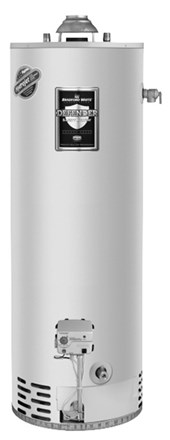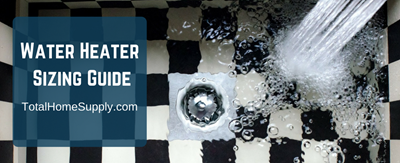A water heater is a huge purchase for any homeowner. With the ever-important task of supplying hot water to your entire home, it’s important to consider all your options before you begin the shopping process. Here, we’ll discuss the different types of water heaters available, with a focus on storage, fuel type, venting and other features.
Storage Types
There are two primary types of water heaters: tankless and storage tank.
Tankless Water Heaters
Tankless water heaters don’t actually store any water at all. Rather, they contain coils that heat water when you need it, ensuring you always have hot water on demand.
Tankless water heaters are highly efficient because they only heat water when you need to use it. However, they only offer a limited supply of hot water per minute. For this reason, they may not be the best option for a very large family or a high-demand household that frequently uses multiple hot water sources at the same time.
A tankless unit is a great option for those who only need a limited supply of hot water at any given time. The high upfront cost may be a deterrent for some, but their high efficiency and cost savings over time may be worth it in the long run.
Storage Tank Water Heaters
Storage tank water heaters, on the other hand, have an insulated tank that stores hot water. The tank can come in a range of sizes, from 28 gallons to more than 75 gallons. In general, the more people in your household, the larger the tank you’ll need.
Storage tank water heaters are ideal for families and high-demand households because they can support multiple hot water sources simultaneously. For example, if you want to wash the dishes and do laundry while someone is taking a shower, they will be a better option than a tankless water heater.
Tankless Water Heater vs Tank
Tankless and tank water heaters are very similar appliances with the same purpose –– to warm the output water in your home or space.
However, as mentioned above, the primary difference between tank and tankless water heaters is their storage setup. Tankless, which are also called instantaneous or demand type, dispense hot water as needed while tank water heaters have a container where the water is held.
This difference translates to variation in the performance of both kinds of appliances. Since coils in tankless heaters continually heat the water as needed, you have an endless supply of hot water These units are limited in the amount of hot water that can be produced simultaneously. Depending on the product, you can get anywhere from 6.5 to 9.8 gallons per minute with a single unit. You can pair multiple units together if you need more hot water.You may notice a decreased product lifespan if you attempt to overwork a tankless water heater. Despite these drawbacks, tankless systems come out on top in the energy efficiency department. For those with smaller households of one to four people who do not require a great deal of simultaneous water usage, this type is typically a good option.
However, storage tanks are not without their advantages. As opposed to tankless, the storage models hold dozens of gallons of water in an insulated tube, which allows for multiple water-using appliances such as dishwashers and showers running simultaneously without issue. At a higher capacity but lower upfront price point, larger households with greater water usage needs will likely find that the storage units are preferable. Storage tank water heaters’ comparatively simple setup also are less costly to maintain and repair. However, before deciding between a tank or tankless water heater, consider which fuel type, venting style, and classification best fit your situation.
Fuel Type
You must determine what type of fuel source you’ll use before you make your purchase.
Water heaters are available in natural gas, liquid propane and electric. Some water heaters can also connect to your boiler, if you have one.
Natural Gas
Natural gas is a fossil fuel that’s emitted by decomposing organisms deep in the ground. It is more cost effective than propane, which makes it attractive for those who are looking to save money.
However, natural gas functions as a greenhouse gas when released into the environment. For this reason, it isn’t the most environmentally friendly fuel source. It is also not available in all homes.
The verdict: If saving money is your biggest priority, then a natural gas water heater may be a great option for you.
Propane
Propane is a clean-burning, environmentally friendly alternative to natural gas. It produces less carbon monoxide than natural gas, making it safer as well.
While propane is a safer and eco-friendlier option than natural gas, it’s unfortunately more costly. Propane is typically at least one-third more expensive than natural gas, which is something to consider if you’re on a budget. Propane is typically used in more rural areas where natural gas is not available.
The verdict: A propane water heater is a clean alternative to natural gas, but may be more expensive to use.
Electric
Electric units are typically less expensive to install than gas water heaters, but much more expensive than gas over time. Electric units cost about twice as much to operate when compared to natural gas. As far as the environment goes, electric takes the cake as the most eco friendly fuel source.
The verdict: If you value the environment above all else, an electric water heater is the way to go.
Water Heater Venting
If you decide to go with a natural gas or a propane appliance, you will also want to think about how to vent your water heater. At Total Home Supply, we give you the option of four types of venting: standard atmospheric vent, power vent, direct vent, and power direct vent. Only electric water heaters are non-vented.
- Standard Atmospheric Vent: These units vent out through a traditional chimney. The vent pipe must extend up, out, and above the roof line. This is the least efficient form of venting a gas water heater.
- Power Vented: These models use a fan to force the exhaust out. They can be vented vertically or horizontally, but cannot be vented through a chimney, unless it is lined with the proper sized pipe. They also can be easily vented through a wall.Power Vented hot water heaters tend to be more fuel efficient. If possible, locate the unit so that the venting length and number of elbows are kept to the minimum distance necessary to reach the outside.
- Direct Vent: Direct vent water heaters use a concentric pipe that takes in outside air for combustion as well as exhausting the combustion fumes. These are great for an area that does not have sufficient intake air.
- Power Direct Vent: A combination of power venting and direct venting, these heaters have the efficiency advantages of a power vent while also using outside air for combustion.
Features
The water heaters we carry at Total Home Supply come with a vast assortment of features:
- Energy Star Qualification - The Rinnai RUR199i 9.8 GPM Sensei+ Condensing Tankless Hot Water Heater with Built-In Re-Circulation Pump stands out as our most efficient water heater. With the Energy Star seal of approval, you can trust that this product will help keep energy costs low and protect the environment.
- ICON Control System - All Bradford White water heaters feature this system, which maintains accurate and consistent water temperature. Other features include intelligent diagnostics, pilot-on indication and powerful performance software.
- Defender Safety System - An added safety feature that reliably prevents vapors from igniting. It meets stringent requirements mandated by the American National Standards Institute (ANSI).
- Hydrojet Total Performance System - This system is designed to heat water quickly and efficiently by mixing stored water with incoming water.
One other important feature to consider before purchasing a option is its size. You’ll want to make sure that whichever water heater you decide on can fit in your home.
Buying Your Water Heater
Now that you have a better idea of what to look for, we hope you can begin shopping with confidence. As with all our products, our water heaters ship for free to the contiguous U.S.
For more information, check out our Water Heater Sizing Guide or contact our staff today.




